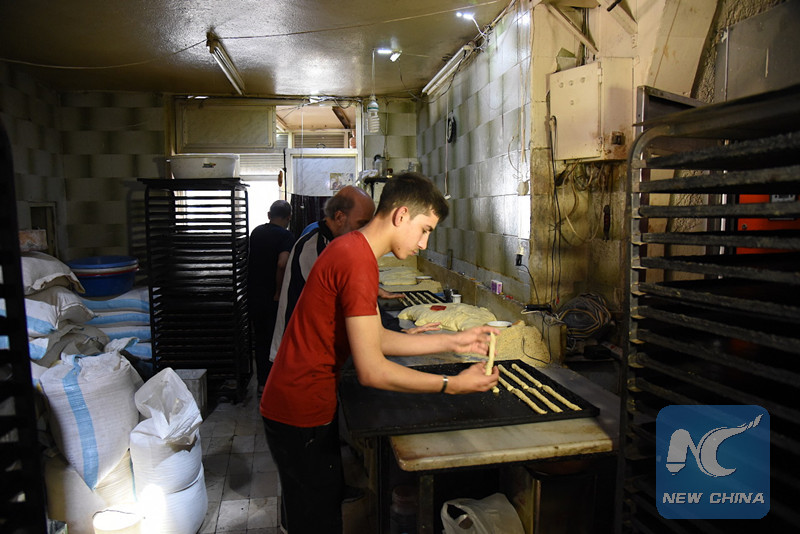
A baker prepares sesame seed breadsticks in an ancient bakery in the old city of Aleppo, northern Syria, on May 6, 2018. (Xinhua/Hummam Sheikh Ali)
ALEPPO, Syria, May 9 (Xinhua) -- Despite the massive destruction of its ancient treasures in the past years of war and violence, the historic spirit and glorious past of the Syrian city of Aleppo is still alive.
When visiting Aleppo's ancient city, one of the most important historic Syrian cities, one can't help but being mesmerized by the greatness of its past as being one of the important stop of the ancient Silk Road.
Even though the ancient city is largely buried in ruins now, every falling stone perhaps dates back to hundreds of years.
In the Bab al-Nasr Souk, reportedly dating back to the Greek Phase B.C., only three or four shops have reopened since the city was liberated from the rebels in late 2016.
The souk is named after the adjacent Bab al-Nasr, or the Victory Gate, the northern gate of the ancient city of Aleppo. It has been destroyed and rebuilt several times throughout the history as it was hit by earthquakes in the ancient time.
One of these shops is an old bakery, possibly the only one of its kind in old Aleppo now.
This bakery produces various types of cookies and bagels, the most famous of which is the sesame seed breadsticks, known as Kaak al-Sakhaneh in Arabic, which used to be the most favorite food for the travelers and merchants on the ancient Silk Road.
Khaled Mari, current owner of the bakery, told Xinhua that the breadsticks are so popular among the travelers because they could last for months.
"People used to come and take the Kaak al-Sakhaneh in wrapped bags and would travel long distances, and as long as it's dry and not penetrated by humidity, it could last for two months and the taste remains the same as if just coming out from the oven," said Mari.
He explained that the bagels are heated several times in the oven until they are completely dry so that they won't easily become mouldy and rotten during the travel.
Recounting what his father and grandfather had told him, Mari said the Silk Road merchants used to buy this breadsticks while crossing Aleppo's old city toward Constantinople, Anatolia, the Black Sea and all the way to Europe.
He said that this bagel is still very popular for current residents in Aleppo just like the ancient time of Silk Road.
Alaa al-Sayyed, a lawyer and historical researcher, told Xinhua that the ancient city of Aleppo was located on the crossroads of several trade routes in the past.
"Aleppo was in the heart of the Silk Road, the one coming from China in the Far East toward what is currently known as Western Europe and the Spice Route coming from the far south in India to Yemen, Hijaz, the Levant and then north of Aleppo heading either towards the Black Sea to Armenia or the Caspian Sea, or to Constantinople to enter Western Europe," he said.
Al-Sayyed, who has many recent discoveries in the Bab al-Nasr gate area, said the caravans of the Silk Road used to pass through this market during their travels.
He said Bab al-Nasr, the northern gate of the ancient city of Aleppo, was so important as the commercial caravans used to pass through it to the ancient souk where shops were lined on both sides of the streets.
At the end of this souk, there were two Khans, or caravanserais, namely the Khan Kotbeh and Khan al-Wazir, in which the merchants used to sleep during their stay to exchange goods in the city. The Khans were damaged during the war in Aleppo.
Al-Sayyed said the Kaak al-Sakhaneh was one of the food items the merchants purchase while visiting Aleppo.
"The merchants used to buy their supplies from this souk and there are two bakeries here and I think that those bakeries are historic and used to produce special food for the caravans, including the Kaak al-Sakhaneh, which is characterized as being free of any humidity and can be taken for long trips," al-Sayyed said.
Nowadays, this souk, as well as the majority of the ancient souks in Aleppo, is largely destroyed by the war that raged in Syria. But, with the end of the war, signs of life have begun returning to the ancient city.
The shops that were not heavily damaged have started operating again, including the bakery that makes the Kaak al-Sakhaneh.
China has launched the Belt and Road Initiative since 2013, with an aim of building a trade and infrastructure network connecting Asia with the Middle East, Africa and Europe along the ancient trade routes including the Silk Road.
Hopefully, Aleppo could revive its past fame and prosperity through participation in the Chinese initiative, and restoration of its ancient marketplaces and shops.

